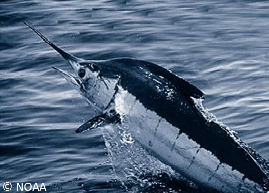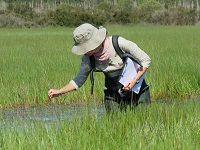Large pelagic fishes are top predators inhabiting the water column of the tropical and subtropical Pacific Ocean. They are highly migratory organisms, and for Ecuadorian fisheries, they also represent important economic resources. Four shark species, Prionace glauca, Isurus oxyrinchus, Carcharhinus falciformis and Alopias pelagicus, and 3 billfish species, Xiphias gladius, Istiophorus platypterus and Makaira nigricans were sampled, in order to gain understanding of their feeding ecology and trophic interactions through the use and combination of stomach content and stable isotope analyses. Results showed that ?13C values were similar among the 7 pelagic predators (values ranged from -16.45‰ for M. nigricans to -16.73‰ for C. falciformis), suggesting that all of them exploit a similar marine area off the coast of Ecuador. ?15N stable isotope values differed among species (the lowest value was 13.83‰ for A. pelagicus and the highest value was 18.57‰ for P. glauca), suggesting segregation in the use of the water column and/or diet. The sharks I. oxyrinchus and P. glauca had high values of ?15N and preyed mainly on cephalopods in comparison with the other species, which preyed mainly on fish. In addition to the common use of cephalopods as prey for large pelagic fish, results indicate that these shark species segregate their diet. informacion[at]ebd.csic.es: Rosas-Luis et al (2017) Feeding ecology and trophic relationships of pelagic sharks and billfishes coexisting in the central eastern Pacific Ocean. MEPS 573:191-201 DOI: 10.3354/meps12186
http://www.int-res.com/abstracts/meps/v573/p191-201/


 La Fundación Jaime González-Gordon ofrece cuatro becas para el desarrollo de Trabajos de Fin de Máster sobre Doñana
La Fundación Jaime González-Gordon ofrece cuatro becas para el desarrollo de Trabajos de Fin de Máster sobre Doñana
